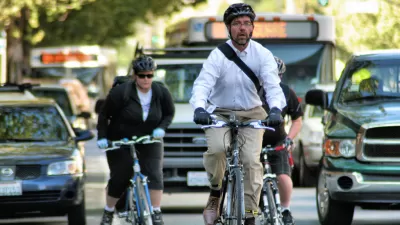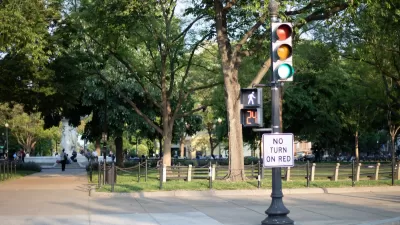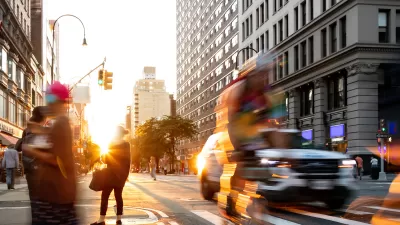A study examines whether and why bicyclists break traffic laws to shed light on how rational those laws really are.

In the Washington Post's "Tripping" blog, Fredrick Kunkle analyzes a study on the behavioral psychology of cycling. That is, the mental calculus cyclists perform to respond to variables like infrastructure, law enforcement, and other users of the road.
Perhaps unsurprisingly, Kunkle writes, "the upshot is that bicyclists are often trying to do the best they can when faced with moving dangers all around and a very small proportion of infrastructure restricted for their use."
The reason most bicyclists (71 percent) violate traffic rules is a bid for self-preservation. Other reasons include saving energy (56 percent) or saving time (50 percent) or attempting to increase one's visibility (47 percent). In other words, the study found that a large number of bicyclists tend to break the law because they think it will keep them safer.
If the way people ride bikes is a reflection of their needs on the road—along the lines of a desire path—then codifying the most common practices into law could better protect cyclists who find them necessary, the report suggests.
Kunkle's analysis comes ahead of the launch of dockless bikeshare in D.C., which is expected to expand ridership in underserved areas. Kunkle also examines other trends in the report, including how other road users navigate traffic laws and how cycling norms evolve in different places.

Alabama: Trump Terminates Settlements for Black Communities Harmed By Raw Sewage
Trump deemed the landmark civil rights agreement “illegal DEI and environmental justice policy.”

Planetizen Federal Action Tracker
A weekly monitor of how Trump’s orders and actions are impacting planners and planning in America.

The 120 Year Old Tiny Home Villages That Sheltered San Francisco’s Earthquake Refugees
More than a century ago, San Francisco mobilized to house thousands of residents displaced by the 1906 earthquake. Could their strategy offer a model for the present?

In Both Crashes and Crime, Public Transportation is Far Safer than Driving
Contrary to popular assumptions, public transportation has far lower crash and crime rates than automobile travel. For safer communities, improve and encourage transit travel.

Report: Zoning Reforms Should Complement Nashville’s Ambitious Transit Plan
Without reform, restrictive zoning codes will limit the impact of the city’s planned transit expansion and could exclude some of the residents who depend on transit the most.

Judge Orders Release of Frozen IRA, IIJA Funding
The decision is a victory for environmental groups who charged that freezing funds for critical infrastructure and disaster response programs caused “real and irreparable harm” to communities.
Urban Design for Planners 1: Software Tools
This six-course series explores essential urban design concepts using open source software and equips planners with the tools they need to participate fully in the urban design process.
Planning for Universal Design
Learn the tools for implementing Universal Design in planning regulations.
Clanton & Associates, Inc.
Jessamine County Fiscal Court
Institute for Housing and Urban Development Studies (IHS)
City of Grandview
Harvard GSD Executive Education
Toledo-Lucas County Plan Commissions
Salt Lake City
NYU Wagner Graduate School of Public Service




























